Hurricane Katrina Homeowners and Immigrant Workers Speak Out for Fair and Compassionate Immigration Reform
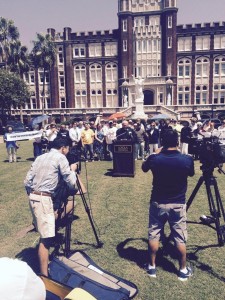
Fr. Fred Kammer, S.J., executive director of the Jesuit Social Research Institute, speaks during the press conference in front of Loyola University New Orleans.
BY ISN STAFF | August 31, 2015
NEW ORLEANS, LA – “We simply could not be where we are on the road to recovery [from Hurricane Katrina] without the labor of undocumented immigrants, and like tens of thousands of New Orleans homeowners, I am eager to stand in solidarity with the immigrant workers who helped rebuild our city,” says homeowner Mary Baudouin, whose mid-city home stood in four feet of Katrina floodwater for three weeks.
On August 28, a group of homeowners from across the region who were assisted by immigrant workers in rebuilding their homes and businesses, spoke out for compassionate and common-sense immigration reform that includes a path to citizenship for undocumented immigrants, including the immigrant workers who have played a critical role in rebuilding New Orleans. Katrina homeowners were joined by a group of immigrant workers who helped rebuild New Orleans and now call the city home. The immigrant workers discussed their work rebuilding the city, how they came to love New Orleans, and the challenges they and their families face living undocumented in our community.
The 10th Anniversary of Hurricane Katrina coincided with a time of increasingly irrational and divisive positions being voiced by U.S. presidential candidates in the debate over immigration, despite the fact that a poll after poll show that an overwhelming majority of Americans favor a plan allowing undocumented immigrants to remain in the U.S. and ultimately become citizens.
“I am happy to speak in their honor and defense. If they were good enough to help us in times of disaster when there weren’t enough U.S. citizens available, then I believe they deserve a way to stay and work here legally,” said Jody Manale from Metairie.
Lower Ninth Ward homeowner John Koeferl notes, “Many Latino workers have endured much to come help us. These workers show values that built America yet find the door closed to citizenship. We need better immigration policies to respect the Latino workers already here working, and to make the economy work.”
According to a housing survey by the U.S. census, 214,700 owner-occupied homes in the City of New Orleans were damaged by Hurricane Katrina. A study by Tulane and Berkeley Universities estimated that approximately one quarter of the reconstruction work force in 2006 was composed of undocumented immigrants. Those workers labored under grueling and hazardous conditions to assist tens of thousands of homeowners rebuild and help make our city whole.
The press conference, organized by the Jesuit Social Research Institute (JSRI) at Loyola University New Orleans looked at immigration through the lens of Catholic Social Teaching (CST). A foundational belief of CST is the dignity and value of all human beings and the need for institutions and governments to serve the common good.
“For too long the dignity of immigrant workers and the common good have been undermined by our broken immigration system which relegates millions to living in the shadows and subjects undocumented immigrants to family separation, detention, and exploitation,” says Rev. Fred Kammer, S.J., executive director of JSRI and Ignatian Solidarity Network board . “The status quo is immoral and simply unacceptable. Recently the debate on immigration has reached new lows. New Orleaneans know first-hand the vital role that immigrants played at a critical time in our on-going recovery from the failed levees. On the 10th Anniversary of Katrina with the eyes of the world on New Orleans, we stand in solidarity with our immigrant sisters and brothers and call upon our political leaders to embrace a workable, practical, and morally defensible solution to our nation’s immigration crisis: comprehensive immigration reform with an earned path to citizenship.”
Read each of the statements shared at the press conference:
Mary Baudouin
Michele Bergeron
John Koeferl
Georgette Ioup
Darlene A. Kattan
Jodie Manale
Rev. Fred Kammer, S.J.
Statement by Mary Baudouin for Katrina Immigrant Workers and Katrina Homeowners Press Conference and Rally:
Hello. My name is Mary Baudouin. After the levees broke in late August, 2005, the Mid-City home where my husband and I and three children had been living stood in six feet of water for three weeks.
In the efforts to rebuild our home, we received a lot of support from family, friends, and volunteers. But the work of immigrant workers, many of whom I am sure were undocumented, was critical. Without their hard work we never could have moved back into our home just 13 months after levees failed.
Immigrant workers from Guatemala did drywall work on the interior of our home. Workers from El Salvador laid tile in our bathroom. Workers from Brazil painted the outside of our house. These immigrant laborers worked long and hard hours. They were very professional and responsible. We also made sure that they were paid a fair wage.
We have the utmost gratitude and respect for the work immigrant laborers performed helping to make our home whole again. Like tens of thousands of New Orleans homeowners, we know that we could not be where we are on the road to recovery without the labor of undocumented immigrants. That is why my family and I are sickened by the hateful rhetoric about immigrants now being spewed by candidates for president.
Such shameful scapegoating must end. Our nation needs compassionate, comprehensive immigration reform to keep immigrant families together and to provide the labor our nation depends on. Today I am honored to stand in solidarity with the immigrant workers who helped rebuild our city. Thank you.
Statement by Michele Bergeron, St. Gabriel the Archangel Church, Gentilly
My name is Michele Bergeron. I lost my home in New Orleans East due to Katrina and did not re-build. My purpose today is to talk about my other home—my church home, St. Gabriel the Archangel Church in Gentilly. St. Gabriel has been a symbol of hope and encouragement to those who live in Pontchartrain Park and Gentilly Woods and was no less so after Katrina. Many volunteers came to St. Gabriel to help rebuild the surrounding community. Many Latin American workers also came and put in substantial effort to help bring the community back. This included helping to gut and sheetrock area homes including our church rectory, make plumbing repairs and even repair the shingles on the church. These workers came from many places. Kremon came all the way from Brazil! Allen, whom I met later, came from Mexico. Some workers returned to their homes, but others have remained here and continue to contribute by their hard work to the rebuilding of New Orleans. They have made homes here and started building families just as many other immigrants have done previously in our American history. How can we now say, “Thank you for your help but you’re not good enough to remain here let alone become an American citizen.” We can’t. It’s just not right. We need comprehensive immigration reform not piecemeal reform. We need a path to citizenship for those who desire to become citizens.
Statement by John Koeferl, Lower Ninth Ward Home Owner
My name is John Koeferl, and I own a house on Tupelo Street in the Lower Ninth where I raised my family. The high winds of Katrina blew the shingles off the roof. Then the levee failed and high water came. The damage was severe. People here had few resources. Church groups sent volunteers that did what they could, and did a lot.
But it was the Latinos that filled in the balance, and work they did! They had skills and energy that made a tremendous difference in our recovery. We owe them a lot. A crew from Brazil did the drywall in our house, very professional work, when no one else was available, at a price we could afford. Immigrants gutted homes, did carpentry and masonry, and much else to aid our recovery. The house across the street was brought back entirely from a shell by a Latino crew, from sill to roof peak.
Many Latino workers have endured much to come help us. These workers show values that built America yet find the door closed to citizenship. Red tape and restrictions of immigration policy hamper lives of Hispanics based on fears we who have worked beside them know are unfounded. We could make the path to citizenship easier for these workers and their families that have helped us and embody our own American values and aspirations.
The Katrina disaster has made us friendships with Latinos we never would have met in ordinary circumstances. They do not all want to be citizens but some do. Many others would like simply the opportunity to continue to work in the U. S.
We should all do what we can to make it easier to be here, as citizens and green card workers. We need better immigration policies to respect the Latinos already here working, and to make the economy work better for all of us. We want the best America we can be working together for a strong future! All God’s children working together, the Dream of Dr King, the promise of America we celebrate this week especially on the 50th anniversary of the march on Washington. Enough of the bombast from certain presidential candidates! Let’s fix immigration policy for our Latino brothers and sisters, and for America.
Statement by: Georgette Ioup, Gentilly (New Orleans) Homeowner
My name is Georgette Ioup. I am a homeowner in Gentilly.
My house flooded from the waters of the broken London Ave Canal walls. I returned for about 3 days in October after the flood waters had receded and Gentilly was accessible, to see to damage mitigation on my house. I found someone to arrange the gutting and mold abatement. The only workers available to him to do this difficult, unhealthy work were the immigrant Latino workers from who were living in their automobiles by Lake Ponchartrain. Because of their hard work and personal sacrifice, the damage to my house was kept from getting worse. They carried out all the heavy ruined furniture and removed the damaged walls and floor. Without the presence of these workers, there would have been no one in New Orleans to do this difficult, necessary work. Later, after I returned to live in a trailer and repair my house, I was able to find a crew from Brazil to do the tile work for the bathroom. Their work was first class – carefully and artfully done. When the new carpeting I ordered was installed, it was a Latino group of workers from Mexico who were sent by the company to install it – again very professionally done.
We in New Orleans owe so much to these immigrant workers for the recovery of our city. They came here to live in very difficult circumstances to allow our city to come back. I believe we need to offer all the help we can to those who need documents to remain here legally. It’s our duty and the least we can do. The statements coming from certain presidential candidates show they have no clue how important immigrant workers have been to New Orleans’s on-going recovery. We had no qualms about using their labor and we should have no qualms about granting them and their family the right to stay here legally. I forever remain indebted to them.
Staemetn by: Darlene A. Kattan
Executive Director of the Hispanic Chamber of Commerce of Louisiana 2006 – 2013
Ten years ago tomorrow Hurricane Katrina swept ashore in New Orleans and on the Gulf Coast. Just as in every emergency or disaster, the heroic first responders came rushing in to rescue us from the rooftops and waters wherever we were holding on, waiting for someone to please come save us.
And then behind those first responders, you – the Latino workers – came charging in. You came with your trucks and tools from all over the United States and from south of the border. You came at great peril – there was no place to live so you slept in trucks, on pieces of cardboard laid on concrete floors in the “bombed out” buildings that Katrina left in her rage, you slept in the park, anywhere you could lay your heads for a few hours of rest and respite from our seemingly merciless sun, heat and humidity. There was no running water or electricity for several weeks or longer, yet that did not deter you.
I met you during those first few months after the storm. Every day I would get in my car and drive all over the city, but especially in Gentilly and Lakeview where the levees had broken. I came looking for you on all of those rooftops to check on you, to bring you bottles of water, to find out how you were being treated and whether you were being paid. I fought hard for your rights before the City Council and other groups.
You rebuilt our homes, our schools, our churches, our business sites one brick at a time. Because of you families were able to return home and reclaim their lives. Today as we look around New Orleans, we see signs of incredible economic growth – new houses, new streets, new office buildings, and the magnificent new BioScience District with its new hospitals and scientific research complexes to serve everyone in our community. BUT – had YOU not come first to rebuild the City and bring us home, none of that would be here today. Were it not for you, we would be living in cardboard boxes under the bridge.
We owe you a debt of gratitude that we can never repay and so today I am here to once again say thank you, thank you for your hard work and for your sacrifices.
Y a ustedes, mis queridos trabajadores Latinos, les digo gracias por entregarnos nuestra Ciudad, y por devolvernos nuestras vidas. Tendré sus rostros quemados en mi corazón el resto de la vida.
Statement by Jodie Manale, Metairie homeowner
My name is Jodie Manale. I am a homeowner in Metairie, LA and a REALTOR. Although I am a native of New Orleans, I was living and working in Pensacola, Florida when Katrina struck. Several of my family members evacuated to my home there, and I met many other folks who evacuated to Pensacola for what they thought was going to be a few days. For many, that turned out to be months to a year or more. Family and friends from New Orleans to Kenner suffered damages to their homes from roof shingles being torn off to being flooded as high as the ceiling. Personally, I suffered damages to my home from Hurricanes Ivan (2004) and Dennis (2005) in Pensacola just before Katrina. We popularized the “blue roof” as almost every home was covered in a blue tarp handed out by FEMA.
Especially when it came to getting roofs replaced in Pensacola and the New Orleans area, I rarely saw a crew that did not have Spanish speaking male workers in it. This was true of the crew that replaced my roof. I, my neighbors, and family and friends did not stop to inquire into the citizenship status of all these men. All we knew was that they were willing to do the hard, nasty work of taking off old roof shingles and replacing them in the highest heat of the summer. And we were grateful! If it weren’t for them, no telling how long we would have waited. I am happy to speak in their honor and defense. If they are good enough to help us in times of disaster when there weren’t enough American citizens available, then I believe they deserve a way to do so legally.
We aren’t talking about people looking for a hand out. We are talking about hard working people who want any American would want – a way to support our families and ourselves and to contribute to our communities with dignity.
For years American employers, large and small, have benefited from the labor of undocumented immigrants to pick our crops, care for our children and our elderly, or help dig communities out of the messes that hurricanes and broken levees created. Undocumented workers have been contributing to our country in important ways and it is time we pay them back through comprehensive immigration reform with a path to citizenship. We are not asking to put them at the front of the line, just to let them get in line and keep their families together. It is the smart, right, and fair thing to do!
Statement by Rev. Fred Kammer, S.J.
Executive Director of the Jesuit Social Research Institute, Loyola University New Orleans
Good afternoon. My name is Father Fred Kammer, S.J. I am the Executive Director of the Jesuit Social Research Institute, which helped organize this press conference. JSRI conducts research, social analysis, education, and advocacy on the core issues of poverty, race, and migration in the Gulf South. JSRI is a collaboration of Loyola University New Orleans and the Jesuits of our U.S. Central and Southern Province.
All over this city, people are remembering Hurricane Katrina and the monumental efforts which have been made by residents and many others who came to help us recover. Too often forgotten in our reflections are the thousands of immigrant workers who took on the most grueling and hazardous work in our rebuilding. Today we gather to honor them and to speak out for a compassionate and just resolution to our nation’s immigration crisis.
The 10th Anniversary of Hurricane Katrina coincides with a time of increasingly negative opinions about immigrants being voiced by some candidates for president, despite the fact that poll after poll show that an overwhelming majority of Americans favor a plan allowing undocumented immigrants to remain in the U.S. and ultimately become citizens.
That’s why it is so important that we hear today from New Orleans area homeowners assisted by immigrant workers in rebuilding after Katrina about why they believe our country needs compassionate and common sense immigration reform. We also want to hear from the immigrant workers themselves about how hard they are working to make our city whole, but how, despite their invaluable contributions to our rebuilding, there exists no way for most to legalize their immigration status.
According to the U.S. census, 214,700 owner-occupied homes in the City of New Orleans were damaged by Hurricane Katrina. A study by Tulane and Berkeley Universities estimated that approximately one quarter of the reconstruction work force in 2006 was composed of undocumented immigrants. As our speakers will attest, those workers labored under horrendous conditions to assist them and tens of thousands of homeowners to rebuild their homes and our city.
It is not just in disaster recovery that immigrants, many of them undocumented, are playing a vital role in the U.S. economy. In agriculture and construction, the seafood and hospitality industries, and many other sectors of our economy, our nation depends on the labor of undocumented immigrants. Nevertheless, we provide no way for most of these workers to legalize their status and become full members of American society. We are here today to say we must end the hypocrisy of our broken immigration system and pass comprehensive immigration reform that honors our values, keeps families together, and works for the American economy.
At JSRI we look at immigration through the lens of Catholic Social Teaching. A foundational belief of that teaching is the dignity and value of all human beings and the need for institutions and governments to serve the common good. For too long the dignity of immigrant workers and the common good of our society have been undermined by a broken immigration system. This system relegates millions to living in the shadows and subjects undocumented immigrants to family separation, detention, and exploitation. The status quo is immoral and simply unacceptable.
The founder of the Society of Jesus, the Jesuits, was Saint Ignatius of Loyola, for whom this university is named. St. Ignatius warned us that the greatest sin was ingratitude and that ingratitude was the source of all other sins. Gratitude, on the other hand, opens the heart in love and generosity, and is key to living a virtuous life. Our speakers now will remind us of the debt of gratitude our community owes immigrant workers and how we must not forget them now—not now when all eyes are on New Orleans and the debate on immigration has reached new lows.
We who live here know first-hand the vital role that immigrants have played in our on-going recovery from failed levees. We stand in solidarity with our immigrant sisters and brothers and call upon our political leaders to embrace a workable, practical, and morally defensible solution to our nation’s immigration crisis: comprehensive immigration reform with an earned path to citizenship.
Thank you very much.
[SOURCE: Jesuit Social Research Institute]

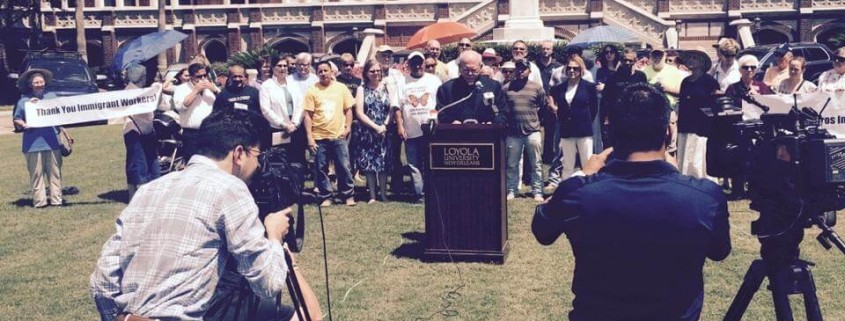
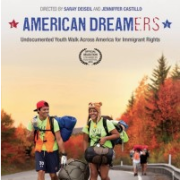
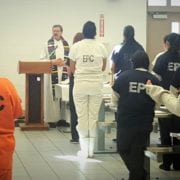
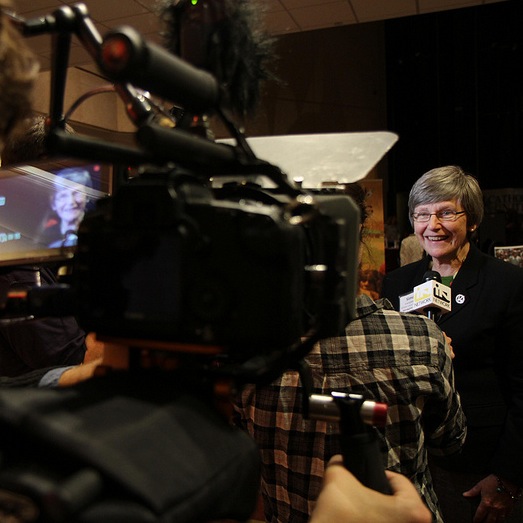
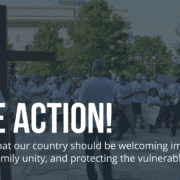
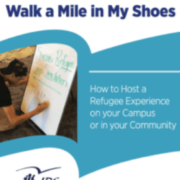
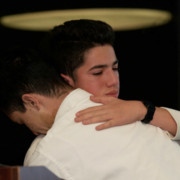



Leave a Reply
Want to join the discussion?Feel free to contribute!